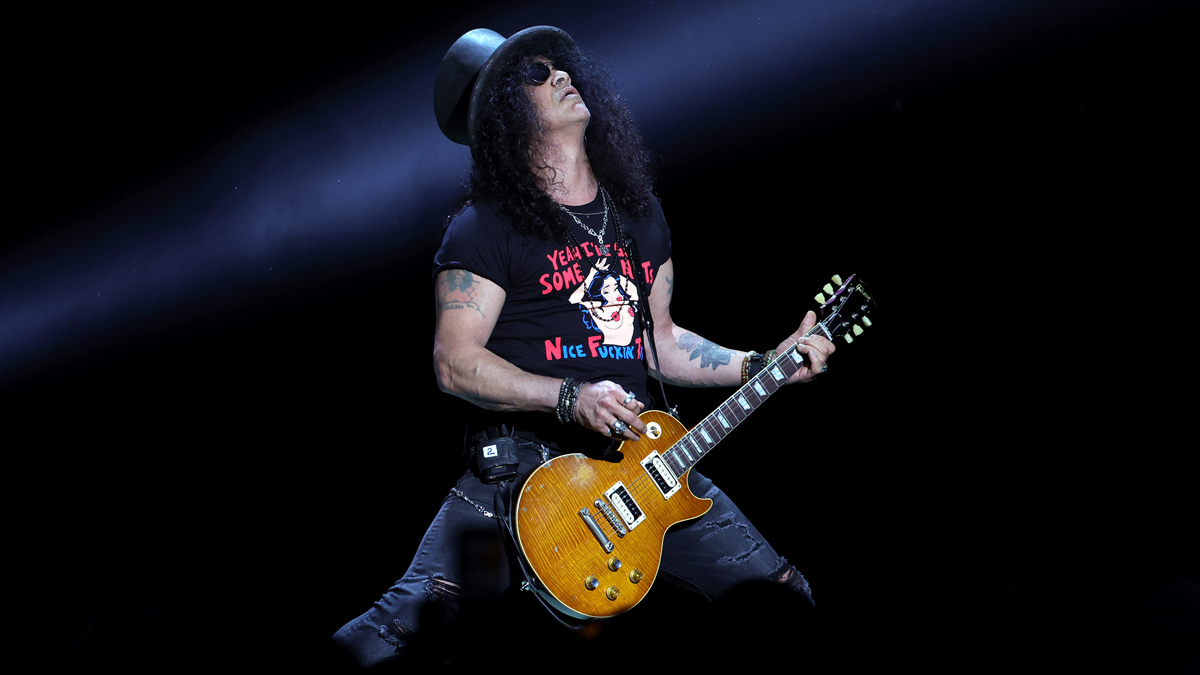
Few relationships in rock ‘n’ roll history are as iconic – mythical, even – as Slash and his Gibson Les Paul. From its roots as an entirely innocent pairing that started with a “cheap $150 knock-off Les Paul”, the combo has since spawned an entire legion of single-cut signature guitars.
Slash is never seen on stage without one, and has been allied with Gibson for over three decades, during which time he’s overseen numerous eponymous Les Paul lines – most recently taking the form of the dedicated Slash Collection – and become a Global Brand Ambassador for the company.
In fact, Gibson even celebrated the release of Slash’s latest solo album, 4, by unveiling a Translucent Cherry-finished Album Edition Les Paul.
Yet despite the longstanding relationship, Slash’s self-proclaimed go-to guitar for recording isn’t, in fact, a Gibson. It’s a Les Paul all right, but not the real deal: instead, it’s his ‘59 LP replica, built by late guitar builder, Kris Derrig.
Speaking to Metro, Slash also attempted to quantify the size of his guitar collection, which he estimated to be “a little bit in excess of 400”.
When asked what his go-to guitar is, Slash revealed, “The go-to guitar for me when I’m recording is the same one I’ve been using since 1987, which is a replica of a 1959 Gibson Les Paul, handmade by the late, great guitar builder, Kris Derrig.
“I recorded Appetite For Destruction with it and I’ve done pretty much every record with it since,” he added. “It has a unique tone and personality to it.”
Get The Pick Newsletter
All the latest guitar news, interviews, lessons, reviews, deals and more, direct to your inbox!
After waxing lyrical about guitars and unpicking his most recent album with Myles Kennedy and The Conspirators, Slash was then asked about his favorite portable music device of all time – a question that also unearthed his least favorite device of all time. And, once again, the response was quite surprising.
Revealing his favorite to be “those little flat Sony cassette players that had a tape on one end and the speakers on the other”, Slash then added, “Since then, there was a period where I had an iPod, which I would take on the road with me for convenience.
“But,” he continued, “the quality of the sound drove me crazy because it was so fucking digital.”
4, Slash’s fourth album with Myles Kennedy and The Conspirators, arrived earlier this month, and was performed in its entirety by the band at a recent Live at Studios 60 livestream concert.
It was also the first LP to be released on Gibson's newly established record label, Gibson Records.

Matt is the GuitarWorld.com News Editor. He has a Masters in the guitar, a degree in history, and has spent the last 16 years playing everything from blues and jazz to indie and pop. When he’s not combining his passion for writing and music during his day job, Matt records for a number of UK-based bands and songwriters as a session musician.
“His songs are timeless, you can’t tell if they were written in the 1400s or now”: Michael Hurley, guitarist and singer/songwriter known as the ‘Godfather of freak folk,’ dies at 83
“The future is pretty bright”: Norman's Rare Guitars has unearthed another future blues great – and the 15-year-old guitar star has already jammed with Michael Lemmo










